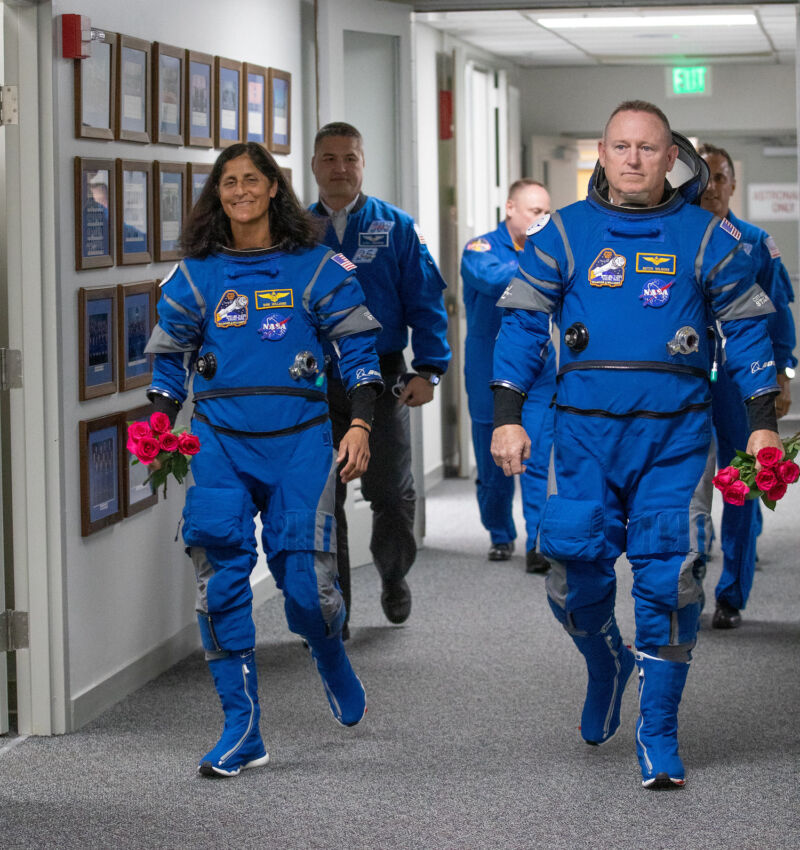
Fresh off repairs at the launch pad in Florida, United Launch Alliance engineers restarted the countdown overnight for the third attempt to send an Atlas V rocket and Boeing’s Starliner spacecraft on a test flight to the International Space Station.
NASA astronauts Butch Wilmore and Suni Williams were expected to awake early Wednesday, put on their blue pressure suits, and head to the launch pad at Cape Canaveral Space Force Station to board the Starliner capsule on top of the 172-foot-tall Atlas V rocket.
Once more through the door
Wilmore and Williams have done this twice before in hopes of launching into space on the first crew flight of Boeing’s Starliner spacecraft. A faulty valve on the Atlas V rocket prevented liftoff May 6, then engineers discovered a helium leak on the Starliner capsule itself. After several weeks of troubleshooting, NASA and Boeing officials decided to proceed with another launch attempt Saturday.
Everything seemed to be coming together for Boeing’s long-delayed crew test flight until a computer problem triggered an automatic hold in the countdown less than four minutes before liftoff. Technicians from United Launch Alliance (ULA), the Atlas V rocket’s builder and operator, traced the problem to a failed power distribution source connected to a ground computer responsible for controlling the final phase of the countdown.
The instantaneous launch opportunity Wednesday is set for 10:52 am EDT (14:52 UTC), when the launch site at Cape Canaveral passes underneath the space station’s orbital plane. Forecasters predict a 90 percent chance of good weather for launch. You can watch NASA’s live coverage in the video embedded below.
The countdown began late Tuesday night with the power-up of the Atlas V rocket, which was set to be filled with cryogenic liquid hydrogen and liquid oxygen propellants around 5 am EDT (09:00 UTC). Kerosene fuel was loaded into the Atlas V’s first-stage booster prior to the mission’s first launch attempt in early May.
The two Starliner astronauts departed crew quarters at NASA’s Kennedy Space Center for the 20-minute drive to the launch pad, where they arrived shortly before 8 am EDT (12:00 UTC) to climb into their seats inside the Starliner capsule. After pressure checks of the astronauts’ suits and Starliner’s crew cabin, ground teams will evacuate the pad about an hour before launch.
Assuming all systems are “go” for launch, the Atlas V will ignite its Russian-made RD-180 main engine and two solid-fueled boosters to vault away from Cape Canaveral and head northeast over the Atlantic Ocean. Wilmore and Williams will be not only the first people to fly in space on Boeing’s Starliner, but also the first astronauts to ride on an Atlas V rocket, which has flown 99 times before with satellites for the US military, NASA, and commercial customers.
The rocket’s Centaur upper stage will deploy Starliner into space around 15 minutes after liftoff. A critical burn by Starliner’s engines will happen around 31 minutes into the flight to finish the task of placing it into low-Earth orbit, setting it up for an automated docking at the International Space Station at 12:15 pm EDT (16:15 UTC) Thursday.
The two-person crew will stay on the station for at least a week, although a mission extension is likely if the mission is going well. Officials may decide to extend the mission to complete more tests or to wait for optimal weather conditions at Starliner’s primary and backup landing sites in New Mexico and Arizona. When weather conditions look favorable, Starliner will undock from the space station and head for landing under parachutes.
The crew test flight is a prerequisite to Boeing’s crew capsule becoming operational for NASA, which awarded multibillion-dollar commercial crew contracts to Boeing and SpaceX in 2014. SpaceX’s Crew Dragon started flying astronauts in 2020, while Boeing’s project has been stricken by years of delays.
Wilmore and Williams, both former US Navy test pilots, will take over manual control of Starliner at several points during the test flight. They will evaluate the spacecraft’s flying characteristics and accommodations for future flights, which will carry four astronauts at a time rather than two.
“The expectation from the media should not be perfection,” Wilmore told Ars earlier this year. “This is a test flight. Flying and operating in space is hard. It’s really hard, and we’re going to find some stuff. That’s expected. It’s the first flight where we are integrating the full capabilities of this spacecraft.”
